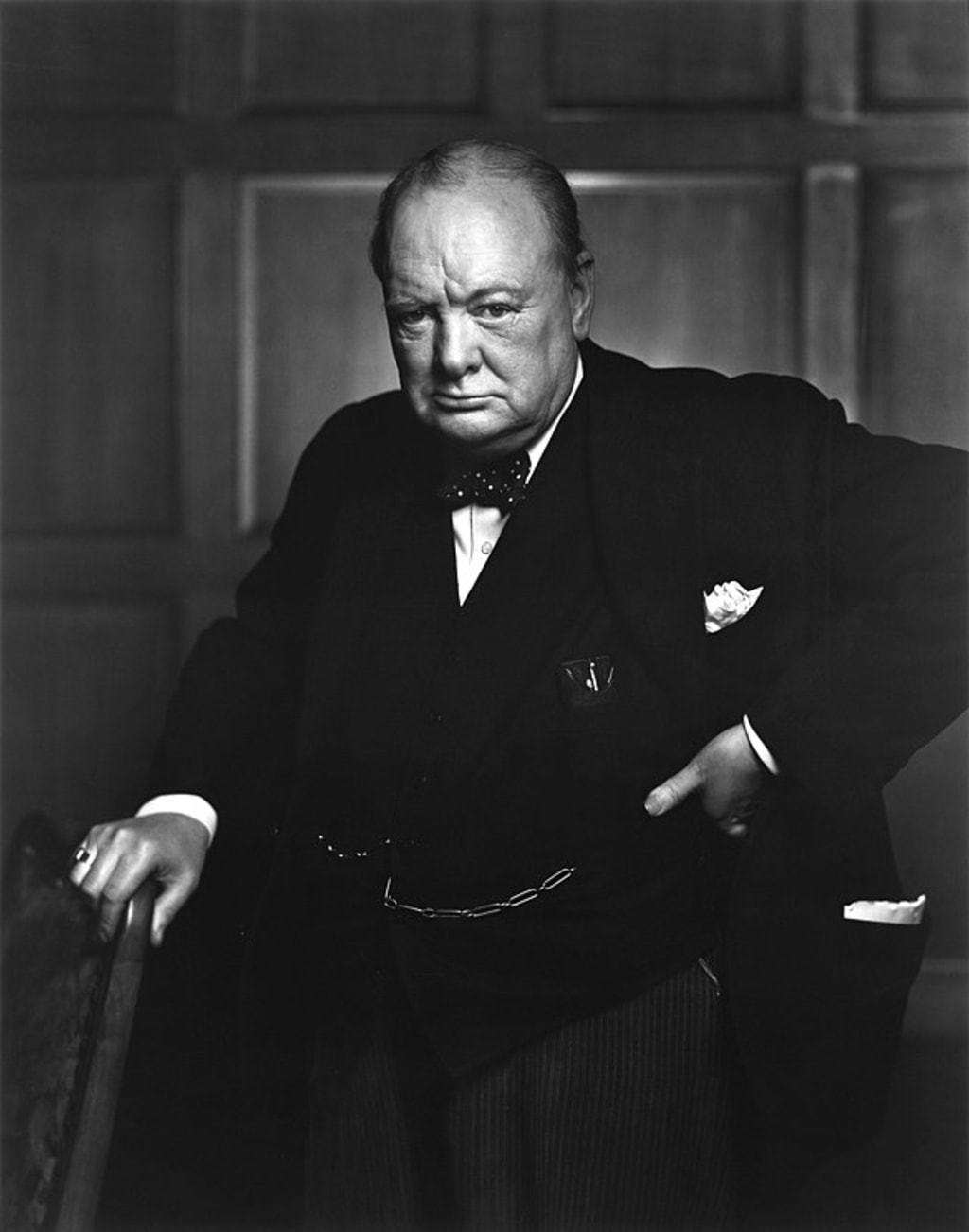Winston Churchill: A Profile In Resilience.
His political trajectory was shaped by a series of missteps and disastrous moves, that by the 1930s, his career was pronounced effectively over and yet by 1940, his mistakes made him a perfect fit for the role of saviour of his country. This is the story of the extraordinary resilience of Winston Churchill.

---
Herbert Henry Asquith, The liberal British prime minster from 1908–1916, in a letter to one of lady friends, wrote of a cabinet colleague:
He will never get to the top of British politics, with all of wonderful gifts; to speak with the tongue of men and angels and to spend laborious days and nights in administration, is no good, if a man does not inspire trust.
A clear indictment, by all parameters. And on whom was it pronounced?
Winston Spencer Churchill, no less.
And for a very long while, it seemed as though, Asquith's prediction would come to pass, mirroring his late father - Lord Randolph Churchill's political career - in the number of hare brained causes that he had championed, bone headed wars that he had fought and contemporaries whom he had alienated.
This article will take a look at a number of his missteps and how they shaped the man widely regarded as Britain's greatest ever prime minister and the greatest Briton, in a BBC poll in 2002.
Crossing the floor
No sooner had he taken his parliamentary seat and given his maiden speech in 1901 than schisms began to appear between him and leadership of the conservatives on the question of free trade and the party's protectionist line.
The Liberal party - the party of the grand old man of British politics - William Ewart Gladstone - which had been out of power since the late 19th century, was now in the ascendant and our protagonist, who was keen to get on in politics, went to give an incendiary speech, denouncing the party's position and topped it all, by crossing the floor (symbolic act of abandoning his party) to join the Liberals, then led by Henry Campbell Bannerman.
On getting to the other side of the parliamentary divide, he took his seat beside a man, who would go on to shape the next fourteen years of his political career: David Lloyd George.
Disaster at Dardanelles
During this period, there had been a change of guard in leadership of the Liberal party, with Asquith taking over Campbell Bannerman as prime minister, in 1908, who had resigned due to ill health.
In 1911, Churchill was appointed the First Lord of the Admiralty, which in modern language, would be referred to as the head of the Navy. It's pertinent to point out that this was when Britain was a major power and America's star was on the rise. His task was to ensure that the Royal navy was fully armed, in the event of war.
It was during Asquith's premiership, that the Great war began, when Archduke Franz Ferdinand was assassinated in 1914. Given Britain's alliance with the French and Russia (pre-revolution), Our hero came up with the idea of attacking Dardanelles, surmising that victory there, would win the war for the allies.
The result of the offensive was the costly for the British led alliance - 250,000 dead or injured and the blame of the defeat was borne by the first lord of the admiralty - Winston Churchill.
By the time the Liberals went into coalition with the conservatives in 1916, one of the conditions was no cabinet position for Churchill.
Another point of note is that Britain's defeat at gallipoli had helped embolden Kemal Ataturk to create the modern nation state of Turkey.
Return to the Gold Standard
When the conservatives withdrew from the Lloyd George led coalition with the Liberals in 1922, a general election was called in which, the Liberals were routed, with our subject, losing his parliamentary seat.
With his flirtation with liberalism, completely dead in the water, Churchill, meekly returns to the Tories. This period of defeat was captured by our hero, in his inimitable rhetorical style:
In the twinkling of an eye, I found myself without a seat, without office and without power.
But by 1924, in Stanley Baldwin's government, he was appointed Britain's minister of finance, a position, eccentrically titled: " The Chancellor of the Exchequer", despite having no background in finance or economics.
Though an initial opponent of the policy, he went with the advice of a number of leading economists and the bank of England in returning the United kingdom to the gold standard.
John Maynard Keynes, the pre-eminent economist of the first half of the twentieth century, was scathing in his criticism of Churchill's decision to revert to the gold standard in his essay: ' the economic consequences of Mr. Churchill, stating that it would lead to depression.
Suffice it to say that reverting to the gold standard at pre-war parity, was cataclysmic; leading to deflation, high unemployment, culminating in the general strike of 1926.
Abdication Crisis
Long removed from his purple patch with the Liberals and his financial stewardship of the country, Churchill wasn't letting up in his profound propensity of championing pointless causes.
One of such was the abdication crisis of 1936.
When George V passed away in 1936, Bertie Windsor, as the first son, immediately ascended to the throne, but there was a little snag; The monarch was due to marry an American divorcee - Wallis Simpson.
Bertie, now known as Edward VIII, in his position as King and the head of the church of England, could never be countenanced marrying a divorcee and the new king, madly in love with the American, was prepared to give up the throne for her and abdicate, he did.
The abdication of the new king, led to a constitutional crisis, which saw Churchill take the side of Edward VII against the conservative government led by Stanley Baldwin.
Churchill's championing of Edward VIII, not least because of the closeness of both men, further confirmed his pariah status, with the royal family, the conservative party and the wider country.
Anti-Gandhi Campaign
In the 1930s, The Labour government made it official policy to grant dominion status to India, which firmly put it on course for full independence.
This move was supported by Tories, who were the party in opposition, but not by Churchill. Our protagonist was diametrically opposed to this line of action and more to the point, repulsed by the heart beat and conscience of the Indian independence movement - Mohandas Gandhi.
Supported by his paymasters, he went on to deliver, what historians have come to regard as a profoundly racist and bigoted speech, describing Gandhi as a " seditious middle temple lawyer, posing as a half naked fakir, striding up the palaces and negotiating on equal terms with the representative of the King-emperor".
Needless to say that this enraged liberal opinion in Britain and America, who identified with India, given that they fought a war of independence with the United Kingdom.
Germany had lost the first world war and for its efforts, found its colonies in Africa taken and had huge indemnities imposed upon her, by the winning team, comprising Britain, France, Italy and the newest kid on the block - the United States of America.
Sympathy and outrage at the treatment of Germany, led to the ineluctable rise of a fringe party in 1928 to mainstream acceptability by 1933.
The fringe party in question? The national socialist party, led by Adolf Hitler.
Under the Fuhrer's leadership, Germany had been silently rearming for years and sympathizers within the royal family, the conservative party and western Europe were prepared to turn a blind eye to its annexation of parts of France, Czechoslovakia and Poland, with the ill fated Neville Chamberlain travelling to meet Hitler and bringing back a worthless piece of paper, which everyone rightly recognized as appeasement, thus undermining his position.
Churchill, however, by the late 1930s was an isolated figure, pointing out the perils of appeasement and Britain's rearmament efforts - but for once, when it mattered most, Churchill was right about Hitler and was alone in understanding his country's perilous position.
All of this meant that when the German chancellor reneged on the undertaking that he signed, Britain was effectively forced to declare war on Germany, thus leading to changes at the top; out was Neville Chamberlain and in came Winston Churchill.
In Adolf Hitler, Winston Leonard Spencer Churchill had the perfect enemy, which meant that his vast experience(mistakes), his impetuosity, his organizational skills, his formidable oratory were now brought to bear on this fanatical foe.
In Churchill, Britain had a leader, on whom she could count, who gave her the confidence to fight, when it was isolated, when it was her lowest ebb - when it seemed that a thousand years of civilization could go up in smoke.
In Churchill, Britain had a leader, who had made several mistakes on the job and was best equipped to steer her to safety in a moment of great peril.
Churchill's resilience, turned to out to be Great Britain's greatest gain.
Thanks very much for reading.
About the Creator
Adebayo Adeniran
A lifelong bibliophile, who seeks to unleash his energy on a number of subjects






Comments
There are no comments for this story
Be the first to respond and start the conversation.